大学英语精读课文、翻译讲课教案
大学英语精读第三版第二册教案

教学目标:1. 通过阅读课文,掌握文章的基本内容和结构。
2. 培养学生阅读理解能力和英语表达能力。
3. 提高学生的词汇量和语法水平。
4. 培养学生自主学习和合作学习的习惯。
教学重点:1. 课文主要内容和结构。
2. 课文中的重点词汇和短语。
3. 课文的语法结构。
教学难点:1. 课文中的长难句理解。
2. 课文中抽象概念的理解。
3. 课文中的词汇和短语运用。
教学工具:1. 多媒体课件2. 课文原文3. 生词表4. 语法讲解资料教学过程:一、导入1. 教师简要介绍课文背景,激发学生的学习兴趣。
2. 引导学生思考课文可能涉及的主题和内容。
二、课文阅读1. 学生自读课文,初步了解文章大意。
2. 教师提问,检查学生对课文内容的理解。
3. 学生分组讨论,进一步分析课文结构。
三、词汇学习1. 教师讲解课文中的重点词汇和短语,提供例句。
2. 学生跟读并模仿例句,巩固词汇。
3. 学生完成词汇练习,检验学习效果。
四、语法讲解1. 教师讲解课文中的语法结构,结合例句进行讲解。
2. 学生跟读并模仿例句,巩固语法知识。
3. 学生完成语法练习,检验学习效果。
五、课文翻译1. 学生分组进行课文翻译,相互检查和纠正。
2. 教师选取部分段落进行点评和讲解。
六、课堂小结1. 教师总结本节课的重点内容和难点,强调学习要点。
2. 学生分享学习心得,提出疑问。
七、课后作业1. 学生完成课后阅读练习。
2. 学生翻译课文中的长难句。
3. 学生预习下一节课内容。
教学反思:1. 教师应根据学生的学习情况,调整教学方法和手段,提高教学效果。
2. 鼓励学生积极参与课堂活动,培养学生的自主学习能力。
3. 关注学生的学习进度,及时调整教学计划,确保教学目标的实现。
教学课时:2课时备注:本教案仅供参考,教师可根据实际情况进行调整。
大学英语精读第三册课教案
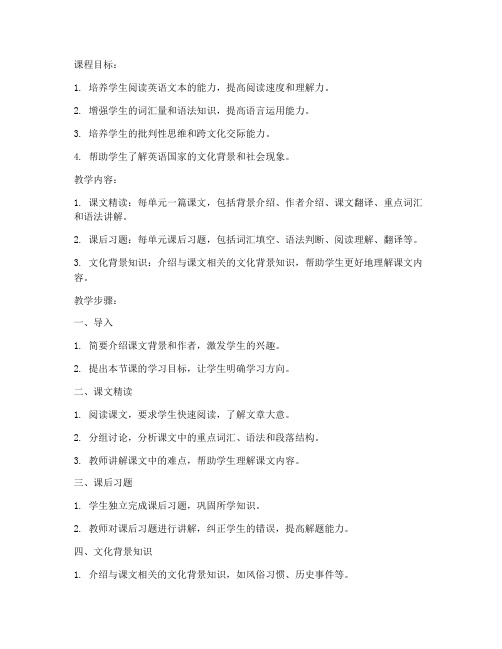
课程目标:1. 培养学生阅读英语文本的能力,提高阅读速度和理解力。
2. 增强学生的词汇量和语法知识,提高语言运用能力。
3. 培养学生的批判性思维和跨文化交际能力。
4. 帮助学生了解英语国家的文化背景和社会现象。
教学内容:1. 课文精读:每单元一篇课文,包括背景介绍、作者介绍、课文翻译、重点词汇和语法讲解。
2. 课后习题:每单元课后习题,包括词汇填空、语法判断、阅读理解、翻译等。
3. 文化背景知识:介绍与课文相关的文化背景知识,帮助学生更好地理解课文内容。
教学步骤:一、导入1. 简要介绍课文背景和作者,激发学生的兴趣。
2. 提出本节课的学习目标,让学生明确学习方向。
二、课文精读1. 阅读课文,要求学生快速阅读,了解文章大意。
2. 分组讨论,分析课文中的重点词汇、语法和段落结构。
3. 教师讲解课文中的难点,帮助学生理解课文内容。
三、课后习题1. 学生独立完成课后习题,巩固所学知识。
2. 教师对课后习题进行讲解,纠正学生的错误,提高解题能力。
四、文化背景知识1. 介绍与课文相关的文化背景知识,如风俗习惯、历史事件等。
2. 分析课文中的文化差异,提高学生的跨文化交际能力。
五、总结与反思1. 教师对本节课的学习内容进行总结,强调重点和难点。
2. 学生分享学习心得,提出自己的疑问和观点。
教学资源:1. 教材:《大学英语精读第三册》2. 教学课件:课文翻译、课后习题、文化背景知识等3. 网络资源:英语学习网站、在线词典等教学评价:1. 课堂参与度:观察学生在课堂上的发言和互动情况。
2. 课后作业完成情况:检查学生的课后习题完成情况,了解学生对知识的掌握程度。
3. 期末考试:通过期末考试检验学生的学习成果。
教学反思:1. 关注学生的学习需求,调整教学内容和方法。
2. 注重培养学生的自主学习能力,提高课堂效率。
3. 加强与学生之间的沟通,营造良好的学习氛围。
大学英语精读教案
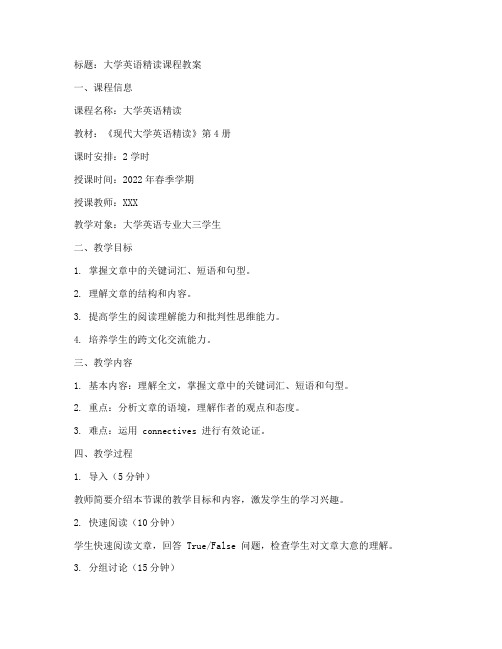
标题:大学英语精读课程教案一、课程信息课程名称:大学英语精读教材:《现代大学英语精读》第4册课时安排:2学时授课时间:2022年春季学期授课教师:XXX教学对象:大学英语专业大三学生二、教学目标1. 掌握文章中的关键词汇、短语和句型。
2. 理解文章的结构和内容。
3. 提高学生的阅读理解能力和批判性思维能力。
4. 培养学生的跨文化交流能力。
三、教学内容1. 基本内容:理解全文,掌握文章中的关键词汇、短语和句型。
2. 重点:分析文章的语境,理解作者的观点和态度。
3. 难点:运用 connectives 进行有效论证。
四、教学过程1. 导入(5分钟)教师简要介绍本节课的教学目标和内容,激发学生的学习兴趣。
2. 快速阅读(10分钟)学生快速阅读文章,回答 True/False 问题,检查学生对文章大意的理解。
3. 分组讨论(15分钟)学生分成小组,讨论文章中的关键词汇、短语和句型,分享学习心得。
4. 词汇讲解(15分钟)教师讲解文章中的关键词汇、短语和句型,引导学生运用所学知识进行分析。
5. 深入阅读(30分钟)学生深入阅读文章,分析文章的结构和内容,理解作者的观点和态度。
6. 小组展示(10分钟)各小组展示讨论成果,分享对文章的理解和感悟。
7. 课堂小结(5分钟)教师总结本节课的主要内容,强调重点和难点。
8. 作业布置(5分钟)教师布置作业,要求学生复习本节课的内容,并进行相关练习。
五、教学方法1. 讲授法:教师讲解文章中的关键词汇、短语和句型,引导学生进行分析。
2. 讨论法:学生分组讨论,分享学习心得,培养合作精神。
3. 案例分析法:教师提供实例,引导学生运用所学知识进行分析。
4. 小组展示法:学生分组展示讨论成果,提高表达能力和交流能力。
六、教学评价1. 课堂参与度:观察学生在课堂上的发言和讨论情况,评估学生的参与程度。
2. 作业完成情况:检查学生作业的完成质量,评估学生的学习效果。
3. 小组展示:评估学生在小组展示中的表现,包括表达能力、逻辑思维和团队合作能力。
大学英语精读1教案

课时安排:2课时授课时间:2023年X月X日教学目的和要求:1. 掌握:理解课文主题,学习并运用关键词汇和短语,掌握一些常用的句型。
2. 熟悉:了解课文结构,分析文章段落大意,提高阅读理解能力。
3. 了解:了解作者观点,拓展相关知识,提高跨文化交际能力。
教学内容:1. 课文:《英语学习策略》2. 词汇:strategies, techniques, memorize, practice, combine, etc.3. 句型:What strategies do you use to learn English? How do you memorize new words?教学过程:第一课时一、导入1. 提问:同学们,你们在英语学习过程中遇到过哪些困难?有哪些有效的学习方法?2. 介绍本节课的主题:英语学习策略。
二、课文阅读1. 学生自读课文,了解文章大意。
2. 教师讲解课文中的重点词汇和短语,如:strategies, techniques, memorize, practice, combine等。
3. 分析文章结构,讲解段落大意。
三、课堂讨论1. 提问:文章中提到了哪些英语学习策略?2. 学生分组讨论,分享自己的英语学习经验。
四、句型练习1. 教师讲解句型:What strategies do you use to learn English? How do you memorize new words?2. 学生练习句型,并用句型进行对话。
五、总结1. 教师总结本节课的学习内容,强调重点词汇和短语。
2. 学生复述课文主题,分享自己的学习心得。
第二课时一、复习1. 复习上节课学习的重点词汇和短语。
2. 学生进行句型练习。
二、课文精讲1. 教师讲解课文中的难句,如:Combining different techniques can help improve your learning efficiency.2. 分析文章中的文化背景知识。
大学英语精读第四册_教案

课程名称:大学英语精读授课班级:XX级XX班授课教师:XXX授课时间:XX周XX节教学目标:1. 掌握本册书中的关键词汇、短语和常用句型。
2. 理解课文内容,提高学生的阅读理解能力。
3. 培养学生的英语写作和口语表达能力。
4. 增强学生对西方文化的了解。
教学内容:1. 课文内容:本册书共包含10个单元,每个单元围绕一个主题展开,如科技、文化、社会现象等。
2. 词汇:学习本册书中的重点词汇,包括形容词、动词、名词、介词等。
3. 句型:掌握常用句型,如一般现在时、一般过去时、一般将来时等。
4. 写作:学习写作技巧,提高写作水平。
5. 口语:通过课堂讨论、角色扮演等方式,提高口语表达能力。
教学重点与难点:1. 重点:课文内容、重点词汇、常用句型、写作技巧、口语表达。
2. 难点:理解复杂句型、提高写作水平、口语表达能力的培养。
教学过程:一、导入1. 复习上一册书的知识,引导学生进入学习状态。
2. 介绍本册书的主要内容和教学目标。
二、课文讲解1. 预习课文,了解课文大意。
2. 分析课文结构,讲解重点词汇和句型。
3. 针对课文内容进行提问,引导学生思考。
三、写作训练1. 介绍写作技巧,如段落结构、过渡词等。
2. 学生根据所学内容进行写作练习,教师批改并给予指导。
四、口语训练1. 课堂讨论:针对课文内容进行讨论,提高学生的口语表达能力。
2. 角色扮演:模拟课文中的场景,让学生进行口语表达。
五、总结与作业1. 总结本节课的重点内容。
2. 布置课后作业,如背诵课文、完成写作练习等。
教学评价:1. 课堂表现:观察学生在课堂上的发言、参与度等。
2. 作业完成情况:检查学生的课后作业,了解学生的学习效果。
3. 写作和口语表达能力:通过写作和口语练习,评价学生的英语水平。
教学反思:1. 不断调整教学方法,提高学生的学习兴趣。
2. 注重培养学生的英语实际应用能力。
3. 及时发现学生的学习困难,给予针对性的辅导。
大学精读课教案
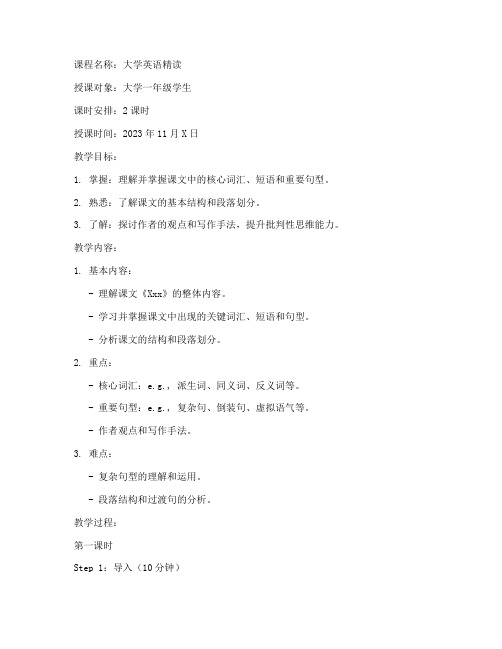
课程名称:大学英语精读授课对象:大学一年级学生课时安排:2课时授课时间:2023年11月X日教学目标:1. 掌握:理解并掌握课文中的核心词汇、短语和重要句型。
2. 熟悉:了解课文的基本结构和段落划分。
3. 了解:探讨作者的观点和写作手法,提升批判性思维能力。
教学内容:1. 基本内容:- 理解课文《Xxx》的整体内容。
- 学习并掌握课文中出现的关键词汇、短语和句型。
- 分析课文的结构和段落划分。
2. 重点:- 核心词汇:e.g., 派生词、同义词、反义词等。
- 重要句型:e.g., 复杂句、倒装句、虚拟语气等。
- 作者观点和写作手法。
3. 难点:- 复杂句型的理解和运用。
- 段落结构和过渡句的分析。
教学过程:第一课时Step 1:导入(10分钟)- 简要介绍作者背景和作品背景。
- 提出本节课的学习目标和重点。
Step 2:预习检查(10分钟)- 检查学生预习情况,提问检查学生对课文内容的初步理解。
Step 3:课文精读(40分钟)- 第一部分(10分钟):逐段讲解,重点讲解生词、短语和句型。
- 第二部分(20分钟):分析段落结构和过渡句,引导学生理解作者观点和写作手法。
- 第三部分(10分钟):小组讨论,让学生分享对课文的理解和感受。
Step 4:课堂小结(10分钟)- 总结本节课的学习内容,强调重点和难点。
- 布置课后作业。
第二课时Step 1:复习导入(10分钟)- 回顾上一节课的重点内容,检查学生对知识的掌握情况。
Step 2:课文拓展(40分钟)- 第一部分(20分钟):分析作者在课文中的论证过程,引导学生思考作者的观点。
- 第二部分(20分钟):探讨课文中的写作手法,如比喻、拟人等,分析其对表达效果的影响。
Step 3:课堂小结(10分钟)- 总结本节课的学习内容,强调重点和难点。
- 布置课后作业。
课后作业:1. 查找课文中出现的生词、短语和句型,进行造句练习。
2. 分析课文中的段落结构和过渡句,撰写一篇读书笔记。
大学英语精读第三版第四册课文及课文翻译
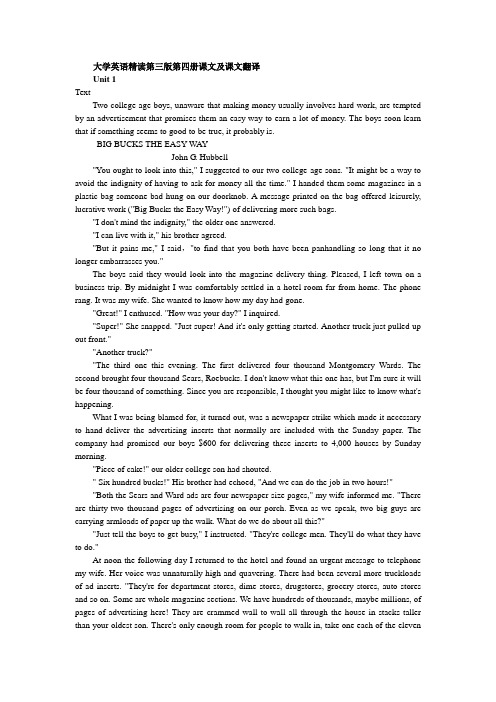
大学英语精读第三版第四册课文及课文翻译Unit 1TextTwo college-age boys, unaware that making money usually involves hard work, are tempted by an advertisement that promises them an easy way to earn a lot of money. The boys soon learn that if something seems to good to be true, it probably is.BIG BUCKS THE EASY W AYJohn G. Hubbell"You ought to look into this," I suggested to our two college-age sons. "It might be a way to avoid the indignity of having to ask for money all the time." I handed them some magazines in a plastic bag someone bad hung on our doorknob. A message printed on the bag offered leisurely, lucrative work ("Big Bucks the Easy Way!") of delivering more such bags."I don't mind the indignity," the older one answered."I can live with it," his brother agreed."But it pains me," I said,"to find that you both have been panhandling so long that it no longer embarrasses you."The boys said they would look into the magazine-delivery thing. Pleased, I left town on a business trip. By midnight I was comfortably settled in a hotel room far from home. The phone rang. It was my wife. She wanted to know how my day had gone."Great!" I enthused. "How was your day?" I inquired."Super!" She snapped. "Just super! And it's only getting started. Another truck just pulled up out front.""Another truck?""The third one this evening. The first delivered four thousand Montgomery Wards. The second brought four thousand Sears, Roebucks. I don't know what this one has, but I'm sure it will be four thousand of something. Since you are responsible, I thought you might like to know what's happening.What I was being blamed for, it turned out, was a newspaper strike which made it necessary to hand-deliver the advertising inserts that normally are included with the Sunday paper. The company had promised our boys $600 for delivering these inserts to 4,000 houses by Sunday morning."Piece of cake!" our older college son had shouted." Six hundred bucks!" His brother had echoed, "And we can do the job in two hours!""Both the Sears and Ward ads are four newspaper-size pages," my wife informed me. "There are thirty-two thousand pages of advertising on our porch. Even as we speak, two big guys are carrying armloads of paper up the walk. What do we do about all this?""Just tell the boys to get busy," I instructed. "They're college men. They'll do what they have to do."At noon the following day I returned to the hotel and found an urgent message to telephone my wife. Her voice was unnaturally high and quavering. There had been several more truckloads of ad inserts. "They're for department stores, dime stores, drugstores, grocery stores, auto stores and so on. Some are whole magazine sections. We have hundreds of thousands, maybe millions, of pages of advertising here! They are crammed wall-to-wall all through the house in stacks taller than your oldest son. There's only enough room for people to walk in, take one each of the eleveninserts, roll them together, slip a rubber band around them and slide them into a plastic bag. We have enough plastic bags to supply every takeout restaurant in America!" Her voice kept rising, as if working its way out of the range of the human ear. "All this must be delivered by seven o'clock Sunday morning.""Well, you had better get those guys banding and sliding as fast as they can, and I'll talk to you later. Got a lunch date.When I returned, there was another urgent call from my wife."Did you have a nice lunch?" she asked sweetly. I had had a marvelous steak, but knew better by now than to say so."Awful," I reported. "Some sort of sour fish. Eel, I think.""Good. Your college sons have hired their younger brothers and sisters and a couple of neighborhood children to help for five dollars each. Assembly lines have been set up. In the language of diplomacy, there is 'movement.'""That's encouraging.""No, it's not," she corrected. "It's very discouraging. They're been as it for hours. Plastic bags have been filled and piled to the ceiling, but all this hasn't made a dent, not a dent, in the situation! It's almost as if the inserts keep reproducing themselves!""Another thing," she continued. "Your college sons must learn that one does not get the best out of employees by threatening them with bodily harm.Obtaining an audience with son NO. 1, I snarled, "I'll kill you if threaten one of those kids again! Idiot! You should be offering a bonus of a dollar every hour to the worker who fills the most bags."But that would cut into our profit," he suggested."There won't be any profit unless those kids enable you to make all the deliveries on time. If they don't, you two will have to remove all that paper by yourselves. And there will be no eating or sleeping until it is removed."There was a short, thoughtful silence. Then he said, "Dad, you have just worked a profound change in my personality.""Do it!""Yes, sir!"By the following evening, there was much for my wife to report. The bonus program had worked until someone demanded to see the color of cash. Then some activist on the work force claimed that the workers had no business settling for $5 and a few competitive bonuses while the bossed collected hundreds of dollars each. The organizer had declared that all the workers were entitled to $5 per hour! They would not work another minute until the bosses agreed.The strike lasted less than two hours. In mediation, the parties agreed on $2 per hour. Gradually, the huge stacks began to shrink.As it turned out, the job was completed three hours before Sunday's 7 a.m. deadline. By the time I arrived home, the boys had already settled their accounts: $150 in labor costs, $40 for gasoline, and a like amountfor gifts—boxes of candy for saintly neighbors who had volunteered station wagons and help in delivery and dozen roses for their mother. This left them with $185 each — about two-thirds the minimum wage for the 91 hours they worked. Still, it was "enough", as one of them put it, to enable them to "avoid indignity" for quite a while.All went well for some weeks. Then one Saturday morning my attention was drawn to the odd goings-on of our two youngest sons. They kept carrying carton after carton from various corners of the house out the front door to curbside. I assumed their mother had enlisted them to remove junk for a trash pickup. Then I overheard them discussing finances."Geez, we're going to make a lot of money!""We're going to be rich!"Investigation revealed that they were offering " for sale or rent" our entire library."No! No!" I cried. "You can't sell our books!""Geez, Dad, we thought you were done with them!""You're never 'done' with books," I tried to explain."Sure you are. You read them, and you're done with them. That's it. Then you might as well make a little money from them. We wanted to avoid the indignity of having to ask you for……"一个大学男孩,不清楚赚钱需要付出艰苦的劳动,被一份许诺轻松赚大钱的广告吸引了。
大学英语精读(修订版)教案
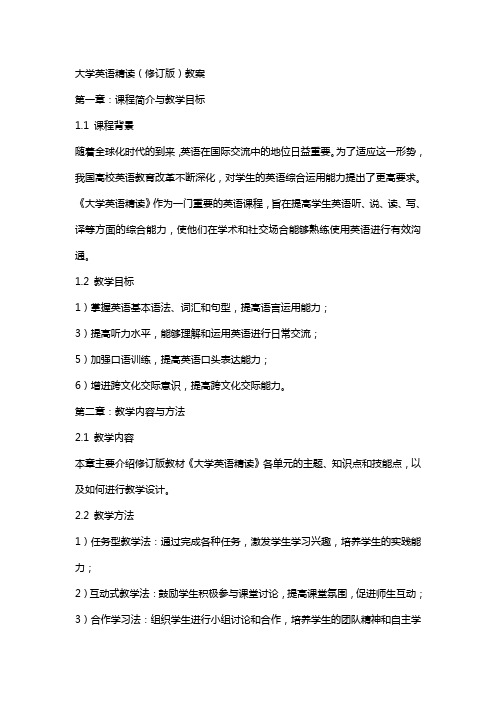
大学英语精读(修订版)教案第一章:课程简介与教学目标1.1 课程背景随着全球化时代的到来,英语在国际交流中的地位日益重要。
为了适应这一形势,我国高校英语教育改革不断深化,对学生的英语综合运用能力提出了更高要求。
《大学英语精读》作为一门重要的英语课程,旨在提高学生英语听、说、读、写、译等方面的综合能力,使他们在学术和社交场合能够熟练使用英语进行有效沟通。
1.2 教学目标1)掌握英语基本语法、词汇和句型,提高语言运用能力;3)提高听力水平,能够理解和运用英语进行日常交流;5)加强口语训练,提高英语口头表达能力;6)增进跨文化交际意识,提高跨文化交际能力。
第二章:教学内容与方法2.1 教学内容本章主要介绍修订版教材《大学英语精读》各单元的主题、知识点和技能点,以及如何进行教学设计。
2.2 教学方法1)任务型教学法:通过完成各种任务,激发学生学习兴趣,培养学生的实践能力;2)互动式教学法:鼓励学生积极参与课堂讨论,提高课堂氛围,促进师生互动;3)合作学习法:组织学生进行小组讨论和合作,培养学生的团队精神和自主学习能力;4)案例分析法:通过分析典型实例,使学生更好地理解和运用所学知识;5)跨文化教学法:引入不同文化的素材和实例,提高学生的跨文化交际能力。
第三章:课堂活动设计与实践3.1 口语表达训练设计各种口语练习活动,如角色扮演、小组讨论、口头报告等,提高学生的口头表达能力。
3.2 阅读理解训练采用问答、摘要、归纳等方法,提高学生的阅读理解能力。
3.3 写作技巧训练通过仿写、改写、写作指导等环节,提升学生的写作技巧。
3.4 听力训练运用音频、视频等教学资源,提高学生的英语听力水平。
3.5 语法和词汇学习通过例句、练习、游戏等方式,巩固学生的语法和词汇知识。
第四章:教学评价与反馈4.1 过程性评价对学生在课堂表现、作业完成、参与度等方面的表现进行评价,及时给予反馈。
4.2 终结性评价通过期中期末考试、课程论文等形式,对学生的综合英语能力进行评价。
大学英语精读第四册(教案)

Book4Unit 1 Big Bucks The Easy WayTeaching Time: 4 hoursStudents’ level:Sophomores of non-English majors in the 2nd semester.Teaching Objectives:1.Help Ss get to know the lesson “No pains, no gains” and there is no “big bucks theeasy way”.2.About the text, Ss should grasp the text content, text structure, basic vocabulariesand required grammar points of the section.Words: cash, echo, competitive, leisurely, pain, sour, finance, marvelous, party, stack, cram, harm, minimum, range, thoughtful, deadline, inform, normally,sale, trash, delivery, inquire, odd, shrinkPhrases & Expressions: pull up, a piece of cake, even as, know better than, be at, make a dent, cut into, have no business, settle for, settle one’s account, quiteawhile, draw attention to, for sale, for rent, be done with, may as well Grammar: p143. About the reading, Ss should learn avoiding vocalization and inner speech.4. About the writing, Ss should learn word choice..5. About the listening, Ss finish the Unit 1 directed by teacher.Teaching Procedures:I. Pre-reading Activities1.Background information1)Montgomery Ward2)Sears,3)Roebuck2.Warm-up questions1)Do you depend on your parents financially?2)Is it easy to earn money by working part-time?3)Are there any easy ways to make much money?3.Key words and expressions:New words and old wordTeacher students(old words or expressions) (new ones)U.S. dollar buckDoor handle doorknobUnhurried leisurelyRelaxed leisurelyProfitable lucrativeSent out deliverEndure live withBeg panhandleTell informFill cramTie bandIncrease reproduceExtra money bonusPart sectionA path walkAn easy job a piece of cakePay settleHave no reason have no businessCome to terms with settle forStrange oddMoney financeFinish be done with English and Chinese phrasesTeacher(Chinese) Students( English)考虑look into总是all the time可以容忍live with令我痛心it pains me易如反掌 a piece of cake壮汉 a big guy干快些get busy好几卡车的truck loads of百货商店department store廉价商店 a dime store小杂货店drug store汽车行auto store外卖餐馆takeout restaurant提高嗓门voice rises超过极限out of the range of恍然大悟work a profound change in 教会某人做人work a profound change inone’s personality 经过调解in mediation结账settle the account劳务支出labor cost相同数额 a like amount托某人做enlist sb. To doII. While-reading Activities1.Ss have the silent reading on the text (10 mins)2.Text and questions for discussionLines 1-91.what did the father tell his college sons to think about?(to deliver bags of magazines to make some of their own money.)2.what was the father worried about?( the sons would become used to or feel content with living by asking for money all the time.)Lines 10-221.why did the mother phone the father?( she wanted him to know what was going on at home.)2.How do you understand the word “super” she snapped?( “super” means very good. But,she “snapped” it, which means she was very angry.She was being sarcastic,i.e. she meant the opposite of what she said.)3.can you paraphrase the sentence “Another truck just pulled up out front”?(Another truck has stopped outside in front of our hous to deliver more materials.) Lines 23-291.which company did the two sons do the delivery job for?( the Sunday Newspaper Company.)2.why did each truck deliver 4000 of the inserts?( Each one was from a different company and had the ads the sons were required to deliver to 4000 houses.)3.why did he think so?( He had no idea of how much work it would mean.)Lines 30-35What did the father mean when he said “they are college men.”?He meant that they were grown-ups, and should be capable of dealing with the situation.Lines 36-501.In what cases does people’s voice become unnaturally high and quavering?When they are excited, angry, upset and the like.2.what does “magazine sections” mean?Parts of magazines, 8 or 12 pages long.3.how many steps are there in the process before delivering?Five: take out, roll, slip, band and slide.Lines 51-661.what do you think of the father’s answer?Clever and sensible. It is a lie, a harmless lie, one told in order to avoid upsetting somebody.2.why did the father say “That’s encouraging”?the sons were learning how to solve the problem of manpower shortage;they hired other people to help, and learnt to improve efficiency by establishing assembly lines.3.why did the mother say “it is very discouraging”?the measures weren’ working at all.Lines 67-771.what do you think of the father’s bon us program?It is reasonable and logical. Bonus is a popular incentive that management adopts. Sometimes we have to lose something in order to gain something. If you are reluctant to use a small bait, you can hardly get a big fish.2.did the son understand that at first thought?No. he thought the more the workers got, the less he obtained.3.why did the son answer “Yes, Sir”?he had come to realize it was a business and he took the father’s instructions as and order.Lines 78-861.what does “see the color of cash” mean?See Note 7 in your text book.2.what’s the difference between the original payment and the demanded one?The original payment was five dollars per person, shile now they demanded five dollars per hour.3.who probably played the mediating role?The mother.Lines 87-94Why did the son think it “enough”?No matter how much, it was the money they made by themselves with great efforts and they learnt a lot from the experience.Lines 95-1091.what did the youngest sons learn from their college brothers?They learnt to make their own money in order to avoid having to ask for money all the time.2.what were they going to do to try to earn money?They were going to sell or rent the family’s books.3.do you agree “you’re never done with books”?Yes. Because………No. bec ause ………..3.T asks Ss to come out the main idea, structure of the text (10mins)4.T summarizes the main idea and structure of the text (5 mins)III. Post-reading Activities1.Let the students do the exercises in the textbook which are related to the newwords.2.Ss hand in the summary of the text.Summary questions and concluding remarks1) Do you think it necessary for the sons to make some money for themselves?Give reasons for your answer.I think it necessary…….because………..2) what do you think is needed in accomplishing something difficult?I think it is self-confidence, perseverance, co-operation or team work,reasonable management, strategies of solving problems, etc.3)what is the father’s tone in telling the story?The tone is light and ironic because the story is meant to be funny. The problem in the story was one that people think is very serious when it happens, but later they can laugh about.3.Ss discuss the questions on the topic related to the text.4.Let Ss do the exercises in the text book which are mainly related to thenew words and topic.5. Exercise:Sentence making in dialoguesTeacher: now I’d like you to complete the following dialogues by making Sentences with the giver phrases.Pull up1.what do you ask your driver to do when you reach your destination?I ask the driver to pull up near the place I want to go.2.what does a bus driver do when a passenger wants to get off?He pulls up at a bus stop.3.what does the red light mean to a moving vehicle?It means that the vehicle must pull up at the zebra.A piece of cake1.can you recite the 26 English letters?Sure. It’s a piece of cake.2.do you think it difficult to use a tape recorder?No. it’s a piece of cake.Make a dent in1.have you finished your outline?No, I’ve hardly made a dent in it.2.How are you getting along with your project?We have made only a small dent in it.Cut into1.do you watch TV in your study period?No. that would cut into my study time.2.what cuts into the factory’s profit?The rise of the labor costs, material prices, the increased consumption of power, etc.Settle for1.if you can’t sell your bicycle at a high price, what will you do?I have to settle for a lower price.2.If you can’t get a well-paid job, will you settle for a lower-paid job?Might/may/could as well1.what do you suggest we do during the winter vacation?If you have nothing to do, you might as well take up a part-time job.2.what should I do if I can’t afford a house?You may as well rent an apartment and set aside your money for a new house.Unit 2 Deer and The Energy CycleTeaching Time: 4 hoursStudents’ level:Sophomores of non-English majors in the 2nd semester.Teaching Objectives:1.Get Ss to know the energy cycle and instruct them to observe the animal’s living instinct in order to value the natural resource; learn about food-enery-life-death.2.About the text, Ss should grasp the text content, text structure, basic vocabularies and required grammar points of the section.Words: tendency, rate, area, plentiful, possessions, currency, scarce, ample, drowsy, fundamental, accumulate, internal, hencePhrases & Expressions: to meet the needs, turn of mind, convert intoGrammar:3. About the reading, Ss should know the usage of dictionary.4. About the writing, Ss should get to know the writing skill—coherence .5. About the listening, Ss finish the Unit 2 directed by teacher.Teaching Procedures:I. Pre-reading Activities1. Warm-up questions1)Allow Ss to go over the text for 10 mins.2)Ask them to list the facts about the life of deer in the four seasonsrespectively.3)Sum up Ss’s results2. Introductory remarks:1) What do you think life depends on?Money, love, or something else?2) where does energy come from?Food, spirit, God, or what?3)what happens to life there is no food , or source of energy?if life useless after it comes to an end?4) Life is energy, isn’t it? What do you think?The planet we live on is made up of 2 major components: living organisms and inorganic substances. As far as living things are concerned, life spans vary. Some may live for thousands of years, while others live only a few seconds. Regardless of the this difference, every life develops from a lower stage to a higher stage until its death, and every species develops in this way, too. But what makes life perform in this way? What happens after life? Our earth has been functioning for billions of years. What has made it work for so long? Let’s have a careful study of the text 3. New words and phrases studyStudy of the words and phrasesNew words and old wordsTeacher students(old words or expressions) (new ones)tendency turn of mindmoney currencychange into convert intoautumn fallsomething stored reservesrare scarceto satisfy the demands to meet the needsarea regionplentiful amplepossessions resourcestore depositspend expendsleepy drowsybecome liquid meltat the same time meanwhilebasic fundamentaltherefore hencecollect accumulateinside internalsmall wooden house cabinEnglish and Chinese PhrasesTeacher(Chinese) students(English)注重/有……的倾向 a … turn of mind生态系统an ecological system 倚赖to depend on年复一年from year to year尽可能多as much as one can旺季times of plenty储存的脂肪reserves of fat/stored fat 不甚出名,鲜为人知less well known能说明问题的例子 a good case in point营养食品nutritious food生理成熟physically mature生育to give birth to食物资源food resources熬过冬天to survive the winter/to pull through the winter 大雪deep snow小雪light snow基本规律 a fundamental ruleII. While-reading Activities1.Text and questions for discussion .Lines 1-61.what does “love makes the world go round” mean?People with a romantic turn of mind think that love, romantic love, is what makes life worth living..2.why does the author say t hat energy is the “currency” of the ecological system?An ecological system is all the plants, animals and people, and their surroundings, considered as a whole, In the commercial world, money is the currency , or means of survival. For life, the most important support is food, the source of energy for life, which allows growth, reproduction, and survival.Lines 7-121.what do wild animals do with the food in different seasons? Why do they do so?Wild animals seem to know when there will be plenty of food and when there won’t. so they eat as much as they can when there is plenty of food so that they can become fat and strong and grow well. In winter, they have little to eat. But they do not starve because the fat they have stored in their bodies brings them through this hard time.Lines 13-221.what does “ this is good timing” mean?This means that the female deer uses the most suitable seasons, i.e.summer and fall, for the birth of fawns and the production of milk because both the conception and production cost the female deer much energy and in both seasons there is plenty of food, which meet the deer’s physical needs.Lines 23-311.to what does the author compare the process of fat reserving?A bank savings account, from which one can draw when he needs the money. Lines 32-441.what is the phenomenon of lowering metabolism?The heart rate slows. The animal becomes slow and drowsy. Therefore, the use of and need for energy is reduced.2.what protects the deer from cold winter? How does it work?They undergo physical and internal physiological changes, i.e. the hair growth andthe slow metabolism. The thick hair keeps the deer warm and the slow metabolism makes the deer consume less energy, which is stored in the form of fat for use when they need it for growth.Lines 45-561.what decreases as winter progresses?The deer’s activities.2.why were people advised to behave like that?To use less oil and electricity for conserving energy to pull through the crisis.3.what does the author imply by “watched the deer”?He implies that men can learn from the deer to reduce unnecessary cost of energy. Lines 57-641.“…to pull them through”. Can you say it in other words?…to help them survive the winter.2.what is the fundamental rule of life?The more fat the deer reserve, the more chance there is for them to survive the crises. Only the largest and strongest are likely to survive.3.Is the fundamental rule of life applicable to human beings?Yes. If we human beings do not protect nature and ourselves by saving energy, we will be punished by nature and will eventually be wiped out from this planet. Lines 65-681.what is the life cycle?Food-energy-life-survival-reproduction-death-food-energy-other life… .Food –energy-seek more food-new energy-food…..Energy is vital to our world. But energy is not always plentiful. The supply can vary, either seasonally or for other reasons. Some animals, the white-tailed deer, for instance, have developed natural ways or varying their own use of energy with the variations of the supply. Human beings can and should learn this lesson for their own survival.2. Teacher explains the key points in detailsturn of mind1.what is your turn of mind?I have a logical turn of mind, or literary/critical/philosophic/humorous/optimisticturn of mind.2.what kind of person is likely to create things?A person of a creative turn of mind is likely to create things.3.what words can you use to describe people of different turns of mind?Down-to-earth, poetic, business-like, humorous, etc.Depend on1.How do crops grow?They depend on the sunlight,water, and fertilizer for growth.2.How are the prices of commodities set?They mainly depend on the relation between demand and supply.A case in point1.can you give an example of a successful person?Yes. A case in point is Thomas Edison, a great inventor.2.can anything heavier than air stay in the sky?Yes. A case in point is the helicopter.3.How can we conclude that a person is selfish.A case in point is…Meet…needs1.why do people drink so much water on the sports ground?They have to meet their body’s needs for water as they play in the sun.2.why does a factory install another assembly line?They want to meet the needs of increasing production.Draw on1.How can a good writer write so many interesting stories?He draws on his experience, knowledge, observation, perception and interpretation of life for the material of his stories.2.How can a person put forward such a peculiar idea?I think he’s drawn on his imagination.Slow down1.what is a driver expected to do if a police car comes towards or follows him/her?He/she is expected to slow down and then stop by the road side.2.what does a runner do after he passes the finish line?He slows down and stops.Pull through1.what should you do in face of difficulties?I should use my skills, work hard,and sometim es I should take somebody’s advice.This might help to pull me through the difficulties.2.why was the little boy, Schatz,waiting for death?He believed he had a fatally high temperature and would not pull through.3.T asks Ss to come out the main idea, structure of the text (10mins)4.T summarizes the main idea and structure of the text (5 mins)III. Post-reading Activities1.Let the students do the exercises in the textbook which are related to the new words.2.Ss hand in the summary of the text.3.Ss discuss the questions on the topic related to the text.4.Let Ss do the exercises in the text book which are mainly related to the newwords and topic.Unit 3 Why Do We Believe That The Earth Is Round? Teaching Time: 4 hoursStudents’ level:Sophomores of non-English majors in the 2nd semester.Teaching Objectives:1.Get Ss to know the author’s purpose is to teach Ss to have a correct attitude towards knowledge and accepting of knowledge by taking the examples of other’s arguments of the shape of Earth.2 About the text, Ss should grasp the text content, text structure, basic vocabularies and required grammar points of the section.Words: preface, remark, cite, exaggerate, mast, appeal, analogy, cast, precarious, produce, burden, botherPhrases & Expressions: appeal to, follow up, for the sake of, throw light on, shaped like, cast on, fall back on, stray away from,Grammar:3. About the reading, Ss should know the reading skills of telling difference bwteenfacts and opinion sentences.4. About the writing, Ss should get to know the writing skill—coherence.5. About the listening, Ss finish the Unit 3 directed by teacher.Teaching Procedures:I. Pre-reading Activities1.Background information1)George Orwell2)George BernardShaw3)The Flat Earth Theory and the Round Earth Theory4)Eclipses5)Playing Cards6)Comrade MaoTse-tung on knowledge, on Direct Experience and IndirectExperience2. warm-up questions and introductory remarks1)Do you believe that the earth is round? Why?Yes, I do, because science proves that it is true.2) Have you heard of other conclusions about the shape of the earth?What are they? Why don’t you believe them?Yes. The earth was said to be flat or oval. I don’t believe them because the photos from satellites or the scenes of eclipses show that it’s round.2)why is “the earth is round” put in a question?3.Key words and expressions:study of the words and phrasesnew words and old wordsteacher students(old words or expressions) (new ones)forward prefacesay,argue remarkquote citesimply merelyaccept without question swallowoverstate exaggerateattract appeal tofor the good of for the sake ofpole on a ship mastbend curvecomparison analogyquickly promptlyround plate discthrow castgo to aim atinsecure precariousturn to for help fall back onin another way otherwisemove from stray away fromshow produceload burdentake trouble botherEnglish and Chinese PhrasesTeacher(Chinese) students(English)在某处somewhere or other序言the preface to中世纪the middle ages普遍认为the widespread belief that 普通人the ordinary citizen迎合口味appeal to我的…完蛋了bang goes my…求助于fall back on不屑一顾would not even bother to反驳say…against天体heavenly body由此可见it will be seen that靠不住的理由precarious reasons知识面the range of knowledge 无力的论据weak argumentII. While-reading Activities1.Ss have the silent reading on the text (10 mins)2.T explains the text in details.Appeal to1.do detective films appeal to you?Yes, ….No, … .2.what kinds of books appeal most to youth?Books on …3.why are children’s clothes colorful?Bright and colorful clothes usually appeal to children.Follow up1.what do the police do if a case is reported to them?They follow up the case.2.what do you do if you read an interesting story series on a newspaper?I follow it up.For the sake of1.what do people usually do for the sake of health?They eat healthy f ood, do exercises and don’t smoke,don’t…2.why is it necessary to widen the streets?It’s necessary to widen the streets for the sake of a smoother flow of traffic. Throw light on1.what is the use of the background knowledge of a story?It throws light on it.2.why are illustrations, data and charts or tables necessary in scientific reports orbusiness presentations?They throw light on the reports and presentations.Shaped like1.Why is a UFO also called a flying saucer?It is shaped like a saucer.2.what is a space shuttle like?It is shaped like a huge plane.Cast on1.what can you see on a moon-lit night in the open?I can see my shadow cast on the ground.I can see the shadows of the trees cast on the wall/window.Fall back on1.why do you set aside some money every month?I set aside some money every month so that I can fall back on it if I get sick orbecome unemployed.2.what do you do when you get lost in a new city?I fell back on the police.Stray away from1.what must you bear in mind when you walk along a path in an area of swamp?I must not stray away from the path.2.what kind of people don’t you like to talk to?I don’t like to talk to those who often stray away from the topic.Text and questions for discussionLines1-71.why is “ Saint Joan” in italics?It is the name of a play. See note 3 in your textbook.2.who is Bernard Shaw?See Note 4 in your textbook. He is widely considered the treatest British dramatist since Shakespeare. He was awarded the Nobel Prize for literature in 1925. For more details, refer to Note 1,2. in Teacher’s book.3.what do “gullible and superstitious” mean?Gullible means willing to believe anything or anyone, easily deceived.“superstitious” means willing to believe something that cannot be explained by reason or science or that brings good or bad luck.4.can you paraphrase “swallows this theory”?accepting the theroy blindly without questioning and suspicions.Lines 8-131.what does “it” refer to in the sentence “ the light it throws on modernknowledge”?It refers to “ the question”2.what is the question that is worth following up?Are we too gullible and superstitious today?3.why does the author only tend to speak of ordinary men when answering why webelieve that the earth is round?Ordinary men don’t have the espertise to prove it scientifica lly.Lines 14-191.why is a distant ship invisible but its mast and funnel can be seen from theseashore?Look at the picture on the next page.2.can you paraphrase “what can I say against it?”I can refute the Flat Earth theory but I need more proofs to refute the Oval Earththeory.Lines 20-261.does the author really “play cards”?no. this is a figure of speech used to mean preenting an argument point by point.“the first card I can play” means the first pointi can make to support my argument.2.what does “analogy of the sun and moon” mean?To compare the earth to the sun and the moon.Lines 27-311.when does a lunar eclipse occur?When the earth passes between the sun and the moon and blocks the sunlight, or casts its shadow onto the moon, a lunar eclipse occurs.e the Oval Earth theory to refute the author’s eclipse argument.The shadow cast on the moon is round, but it doesn’t follow that the earth is spherical. It may perfectly well be flat like a disc.3.what is the author’s argument about the eclipses based on?Publications, such as newspapers and magazines.Lines 32-391.what does the author mean by “ the minor exchanges?”the less important points of debate.2.what does the author think of his previous defeats?He considers them minor/unimportant points, and he is hopeful to win in thedebate.3.who is Royal?See note 6.4.which is higher, Queen,King, or Ace?King is higher than Queen,and Ace is higher than King.5.can you paraphrase the last sentence?Refer to note 23.Lines 40-461.what does “bang goes my ace” mean?My ace doesn’t work. I lose my ace. My argument isn’t conclusive.2.what does the author think of his “ last card”?he believes that the last point of his argument defeats the Oval Earth man.Lines 47-601.what does the author think of his evidence?He doesn’t t hink it convincing enough.2.what does “an exceptionally elementary piece of information” mean?A piece of information that everyone knows.3.what is this piece of information?The earth is round.4.can you use a Chinese saying to explain “when the range of know ledge is so vasthat the expert himself is an ignoramus as soon as he strays away from his own specialty”?隔行如隔山5.what does “ credulous” mean?Ready to believe, without evidence.3.T asks Ss to come out the main idea, structure of the text (10mins)Summary questions and Concluding remarks1.what cards does the author play to refute opinions different from his?The phenomenon of the seashore view, the analogy of the sun and the moon, the earth’s shadow, the newspapers and books, the opinions of the experts, andnavigation.2.do you have any other cards to support the author?High above on a plane, we can see the curved horizon, still higher above in a space ship, astronauts tell us that the earth is round, like a ball. Pictures taken from spaceships or sky labs show the earth in no other shape than spherical.3.can you sum up the main idea of this text?III. Post-reading Activities1.Let the students do the exercises in the textbook which are related to the new words.2.Ss hand in the summary of the text.3.Ss discuss the questions on the topic related to the text.4.Let Ss do the exercises in the text book which are mainly related to the new words and topic.Unit 4 Jim ThorpeTeaching Time: 4 hoursStudents’ level:Sophomores of non-English majors in the 2nd semester.Teaching Objectives:1.Get Ss to know Thorpe’s experiences before and after his career success and the influence of racial discrimination towards American Indians.2.About the text, Ss should grasp the text content, text structure, basic vocabularies and required grammar points of the section.Words: await, arrival, beat, opponent, bunk, strain, utterly, glide, bewildered, desert, declinePhrases & Expressions: build on, breeze through, catch up withGrammar:3. About the reading, Ss should know the usage skimming.4. About the writing, Ss should get to know how to write a recount.5. About the listening, Ss finish the Unit 4 directed by teacher.Teaching Procedures:I. Pre-reading Activities1.Background information2.Introductory remarks: This is a well-known story. The story may not be true,3.Warm-up questions1) who was Jim Thorpe?He was an American Indian, was a great athlete. He won both the pentathlon and the decathlon, the two most demanding Olympic events, in the 1912 Stockholm Olympic Games.2)Can you say anything about Olympic Games?---what is the symbol?Five interlocking circles,red,blue, yellow, black and green, on a white field representing the continents of the world joined in friendship.3)what is the motto?。
大学英语精读电子教案的课程讲解

课时安排:2课时授课对象:大学英语学生教学目标:1. 培养学生的阅读理解能力,提高学生的英语水平。
2. 培养学生运用英语进行思考和表达的能力。
3. 增强学生的文化素养,拓宽学生的国际视野。
教学重点:1. 理解文章的主旨和大意。
2. 掌握文章中的关键信息和细节。
3. 理解并运用文章中的语法和词汇。
教学难点:1. 复杂句型的理解和分析。
2. 词汇的运用和扩展。
3. 文化差异的理解和应对。
教学过程:第一课时一、导入新课1. 教师简要介绍本节课要学习的文章主题,激发学生的学习兴趣。
2. 学生分享自己对文章主题的了解和期待。
二、课文阅读1. 学生自读课文,初步了解文章内容。
2. 教师引导学生找出文章中的关键信息和细节,并进行讲解。
三、课堂讨论1. 教师提出问题,引导学生进行讨论,培养学生的思考和分析能力。
2. 学生积极参与讨论,发表自己的观点。
四、语法和词汇讲解1. 教师讲解文章中的语法点和词汇,帮助学生掌握语言知识。
2. 学生跟读、模仿,提高语音语调。
第二课时一、复习上节课的内容1. 教师提问,检查学生对上节课内容的掌握情况。
2. 学生回答问题,巩固所学知识。
二、课文精读1. 学生再次阅读课文,深入理解文章的主旨和大意。
2. 教师引导学生分析文章的结构和写作手法。
三、拓展练习1. 教师布置拓展练习,帮助学生巩固所学知识。
2. 学生独立完成练习,提高自己的英语水平。
四、总结与作业布置1. 教师对本节课的学习内容进行总结,强调重点和难点。
2. 布置课后作业,要求学生完成相关练习,巩固所学知识。
教学反思:本节课通过精读课文、课堂讨论、语法和词汇讲解等方式,帮助学生提高阅读理解能力、语言运用能力和文化素养。
在教学过程中,教师应注重以下几点:1. 创设良好的课堂氛围,激发学生的学习兴趣。
2. 引导学生积极参与课堂活动,培养学生的合作精神。
3. 注重学生的个体差异,因材施教。
4. 适时进行教学反思,不断提高教学质量。
大学英语精读教案
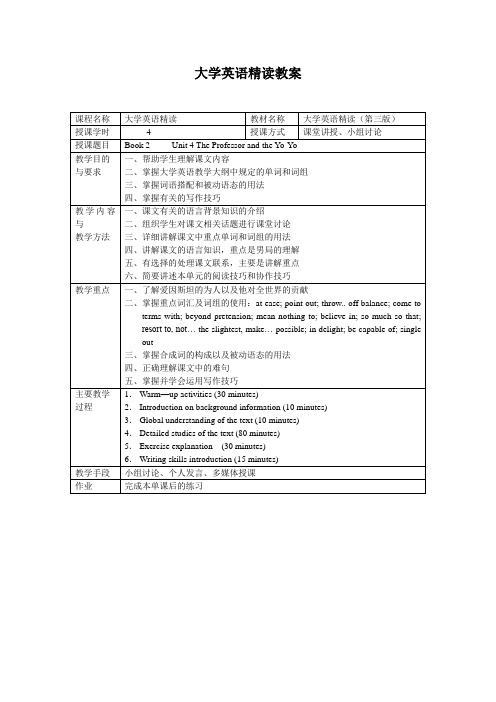
大学英语精读教案Unit 4 The Professor and the Yo-YoPart One Warm—up activities (30 minutes)Questions discussion1. Was Einstein bright in his early childhood? Give examples.2. What is his greatest contribution to the mankind?3. What do you know about the life of Einstein?4. Do you think Einstein was responsible for the search work on the atomic bomb? Why?5. Describe the appearance of Einstein.Part Two Introduction on background information (10 minutes)1.Albert Einstein Albert Einstein, whose Special Theory of Relativity and General Theory of Relativity revolutionized scientific perceptions of the universe, is acknowledged, along with Newton, as one of history’s greatest physicists.Son of free-thinking, cultured Jews, Einstein was unable to speak until he was three and displayed no special promise. Anti-Semitism also hampered his talent when it began to emerge. He became a Swiss citizen in 1901, obtaining a doctorate from the University of Bern in 1905. His research, which ended in the famous equation E=mc2, was published in the same year.After World War I, Einstein’s fame extended beyond the scientific community and in 1921 he was awarded the Nobel Prize for physics. During the 1920s he regarded the rise of the Nazis in Germany with horror, eventually emigrating to the U.S. where, in 1933, he took up a post at Princeton University. In 1939 his early warnings of German scientific attempts to make an atomic bomb prompted the start of the Manhattan Project.2.The Yo-Yo The Yo-Yo is a simple toy consisting of a grooved double disk with a string about the center. The player holds the end of the string which unwinds itself as the disk is dropped. Then by a slight jerk on the string, the player causes it to rewind itself, and to reel up back to the hand. The toy is said to have originated in the Philippines. Since 1930 it has become a popular toy and even today children in different countries play the Yo-Yo and compete in various contests.3.Woolworth’s Frank Winfield Woolworth (1852~1919), an American merchant, was born in Rodman, New York. He established in 1879 a five-cent store at Utica, New York, which failed, and the same year he started a successful five-and-ten-cent store at Lancaster, Pennsylvania. Woolworth opened many others and soon extended business throughout the United States and to several foreign countries. In 1911 the F. W. Woolworth Company was incorporated with ownership of over 1,000 five-and-tens, and he became director of various financial firms. (The last Woolworth stores were closed in 1998.) Woolworth had the Woolworth Building erected in New York City in 1913, the highest building in the world (792 ft / 241.4 m) at that time.Part Three Text analysis and devices for writing (30 minutes)1.Part Division of the TextParagraph 1—6 Einstein was a plain and simple man in his daily life.Paragraph 7—8 Though he was world famous, Einstein remained purely and exclusively a theorist.Paragraph 9—10 Einstein never understood his fame.2.An Analysis of Einstein’s Personality(1). Einstein had no personal ambition.1. He was ready to come to terms with himself and the world around him.2. He knew there were answers beyond his intellectual reach.3. He was content to go as far as he could.4. He never showed jealousy, vanity, bitterness, anger, resentment, or personal ambition.(2) Einstein believed in simplicity.1. He was beyond pretension.2. He bought his stationary in Woo lworth’s, a five—and—ten—cent variety store.3. He never carried his money with him because he had no ues for it.4. He used only water and safety razor to shave.5. He needed only a pencil and a pad of paper to do his work.(3). Einstein was purely and exclusively a theorist.1. He did not have the slight interest in the practical application of his ideas and theories.2. He would not walk down the street to see a reactor create atomic energy.3. He did not have any curiosity in observing how his Photoelectric Theory could make TV possible.4. He tried in vain to deduce the operating principle of a toy bird but refused to take it apart to see how it actually worked.(4).Einstein was easy to approach and was beyond any pretension.1. He wrote na long poem of thanks to a small boy who had sent him a Yo—Yo.2. He corresponded with many of the world’s most important people with ordinary stationery.3. He thought that his ideas had been accepted because he was a lucky man.Part Four Detailed studies of the text (65 minutes)1. useful expressions (50 minutes)1.at ease: in a relaxed positioneg.He put the soldiers at ease while waiting for inspection.Collocation:with ease轻而易举地;毫不费力地ill at ease不安;心神不宁(stand) at ease稍息take one’s ease使自己舒服一下;休息;放松2.point out : explain, call to attentioneg.C a n y o u p o i n t o u t a n y m i s t a k e s?3.off balance: unsteady or unsteadily, in danger of fallingeg.The small boat got off balance and turned over in a storm.Collocation:achieve / acquire balance取得平衡adjust the balanc e调整平衡keep / maintain one’s balance保持平衡,保持镇静lose one’s balance失去平衡,心慌意乱in the balance悬而未决,不能肯定on balance总而言之,总的来说(be) out of balance失去平衡4.c o m e t o t e r m s w i t h:a c c e p t(s t h.o n e d o e s n't w a n t t o a c c e p t)a n d d e a l w i t h i t i n t h e b e s t w a y o n ec a neg. In less than a year, he came to terms with his life and work there.5.ambition: n. a strong desire to achieve sth., such as fame or powereg. A sparrow cannot understand the ambition of a swan. 燕雀安知鸿鹄之志。
大学英语精读课文、翻译讲课教案

大学英语精读课文、翻译讲课教案大学英语精读一课文加翻译(转自baidu知道)Some Strategies for Learning EnglishLearning English is by no means easy. It takes great diligence and prolonged effort.学习英语绝非易事.它需要刻苦和长期努力.Nevertheless, while you cannot export to gain a good command of English without sustained hard work, there are various helpful learning strategies you employ to make the task easier. Here are some of them.虽然不经过持续的刻苦努力便不能期望精通英语,然而还是有各种有用的学习策略可以用来使这一任务变得容易一些.一下便是其中的几种.1. Do not treat all new words in exactly the same way. Have you ever complained about your memory because you find it simply impossible to memorize all the new words you are learning? But, in fact, it is not your memory that is at fault. If you cram your head with too many new words at a time, some of them are bound to be crowded out. What you need to do is to deal with new words in different ways according it how frequently they occur in everyday use. While active words demand constant practice and useful words must be committed to memory, words that do not often occur in everyday situations require just a nodding acquaintance. You will find concentrating on active and useful words the most effective route to enlarging your vocabulary. 不要以完全相同的方式对待所有的生词.你可曾因为简直无法记住所学的所有生词而抱怨自己的记忆力太差?其实,责任并不在你的记忆力.如果你一下子把太多的生词塞进头脑,必定有一些生词会被挤出来.你需要做的是根据生词日常使用的频率以不同的方式对待它们.积极词汇需要经常练习,有用的词汇必须牢记,而在日常情况下不常出现的次只需要见到时认识即可.你会发现把注意力集中于积极有用的词上是扩大词汇量最有效的途径.2. Watch out for idiomatic ways of saying things. Have you ever won dered why we say, “I am interested in English”, but “I am good at French”? And have you ever asked yourself why native English speakers say, “learn the news or secret”, but “learn of someone’s success or arrival”? These are all examples of idiomatic usage. In learning English, you must pay attention not only to the meaning of a word, but also to the way native speakers use it in their daily lives.密切注意地道的表达方式.你可曾纳闷过,为什么我们说“我对英语感兴趣”是“I’m interested in English”, 而说“我精于法语”则是“I’m good at French”? 你可曾问过自己,为什么以英语为母语的人说“获悉消息或秘密”是“learn the news or secret”, 而“获悉某人的成功或到来”是“learn of someone’s successor arrival”?这些都是惯用法的例子.再学习英语时,你不仅必须注意词义,还必须注意以英语为母语的人在日常生活中如何使用它.3. Listen to English every day. Listening to English on a regular basis will not only improve your ear, but will also help you build your speaking skills. In addition to language tapes especially prepared for your course, you can also listen to English radio broadcasts, watch English TV, and see English movies. The first time you listen to a taped conversation or passage in English, you may not be able to catch a great deal. Try to get its general meaning first and listen to it over and over again. You will find that with each repetition you will get something more.每天听英语.经常听英语不仅不提高你的听力,而且有助你培养说的技能.除了专为课程准备的语言磁带外,你还可以听英语广播,看英语电视和英语电影.第一次听录好音的英语对话或语段,你也许不能听懂很多.先试着听懂大意,然后再反复地听.你会发现每次重复都会听懂很多更多的东西.4. Seize opportunities to speak. It is true that there are few situations at school where you have to communicate in English, but you can seek out opportunities to practice speaking the language. Talking with your classmates, for example, can be an easy and enjoyable way to get some practice. Also try to find native speaker on your campus and feel free to talk with them. Perhaps the easiest way to practice speaking is to rehearse aloud, since this can be done at any time, in any place, and without a partner. For instance, you can look at pictures or objects around you and try to describe them in detail. You can also rehearse everyday situations. After you have made a purchase in a shop or finished a meal in a restaurant and paid the check, pretend that all this happened in an English-speaking country and try to act it out in English.抓住机会说.的确,在学校里必须用英语交流的场合并不多,但你还是可以找到练习的英语的机会.例如,跟你的同班同学进行交谈可能就是得到一些练习的一种轻松愉快的方式.还可以找校园里以英语为母语的人跟他们随意交谈.或许练习讲英语最容易的方式是高声朗读,因为这在任何时间,任何地方,不需要搭档就可以做到.例如,你可以看着图片或身边的物件,试着对它们详加描述.你还可以复述日常情景.在商店里购物或在餐馆里吃完饭付过账后,假装这一切都发生在一个讲英语的国家,试着用英语把它表演出来.5. Read widely. It is important to read widely because is our learning environment; reading is the main and most reliable source of language input. When you choose reading materials, look for things that you find interesting, that you can understand without relying too much on a dictionary. A page a day is a good way to start. As you go on, you will find that you can do morepages a day and handle materials at a higher lever of difficulty.广泛阅读.广泛阅读很重要,因为在我们的学习环境中,阅读是最重要,最可靠的语言输入来源.在选择阅读材料时,要找你认为有趣的,不需要过多依赖词典就能看懂的东西.开始时每天读一页是个好办法.接下去,你就会发现你每天可以读更多页,而且能对付难度更高的材料.6. Write regularly. Writing is a good way to practice what you already know. Apart from compositions assigned by your teacher, you may find your own reasons for writing. A pen pal provides good motivation; you will learn a lot by trying to communicate with someone who shares your interests, but comes from a different culture. Other ways to write regularly include keeping a diary, writing a short story and summarizing the daily news.经常写,写作是练习你已经学会的东西的好方法.除了老师布置的作文,你还可以找到自己要写的理由.有个笔友可以提供很好的动力;与某个跟你趣味相投但来自不同文化的人进行交流,你会学到很多东西.经常写作的其他方式还有记日记,写小故事或概述每天的新闻.Language learning is a process of accumulation. It pays to absorb as much as you can from reading and listening and then try to put what you have learned into practice through speaking and writing.语言学习是一个积累的过程.从读和听中吸收尽量多的东西,然后再试着把学到的东西通过说和写 .。
大学精读英语4教案

教学目标:1. 让学生掌握本单元的词汇和短语。
2. 提高学生的阅读理解能力。
3. 培养学生的口语表达能力。
4. 培养学生对自然环境的热爱和保护意识。
教学时间:2课时教学对象:大学本科英语专业学生教学准备:1. 教材:《大学英语精读4》2. PPT课件3. 录音材料4. 白板、粉笔教学过程:第一课时:一、导入1. 通过图片或视频展示自然环境的美,激发学生对自然环境的兴趣。
2. 提问:你们对自然环境有什么样的感受?你们喜欢亲近大自然吗?二、阅读课文1. 学生自主阅读课文,了解课文大意。
2. 教师提问,检查学生对课文的理解程度。
三、词汇讲解1. 教师讲解课文中的重点词汇和短语,如:woods、bushes、clearing、deer、solitude等。
2. 学生跟读,加深对词汇的记忆。
四、课文分析1. 分析课文结构,了解作者的写作思路。
2. 分析作者对自然环境的描述,体会作者的情感。
五、讨论1. 学生分组讨论,谈谈自己对课文的理解和感受。
2. 各组代表发言,分享讨论成果。
第二课时:一、复习1. 复习上一节课的词汇和短语。
2. 学生默写课文中的重点词汇。
二、口语练习1. 学生根据课文内容,用英语进行角色扮演。
2. 教师指导,纠正学生的发音和语法错误。
三、写作练习1. 学生根据课文内容,写一篇关于自己亲近自然经历的短文。
2. 教师批改,指出学生的优点和不足。
四、总结1. 教师总结本节课的学习内容,强调课文中的重点词汇和短语。
2. 学生分享自己的学习心得。
教学反思:本节课通过阅读、讨论、口语和写作等多种形式,帮助学生掌握课文内容,提高英语综合运用能力。
在教学过程中,教师应关注学生的个体差异,针对不同学生的学习需求进行个性化指导。
同时,注重培养学生的环保意识,引导他们热爱大自然,保护自然环境。
大学英语精读第三版教案
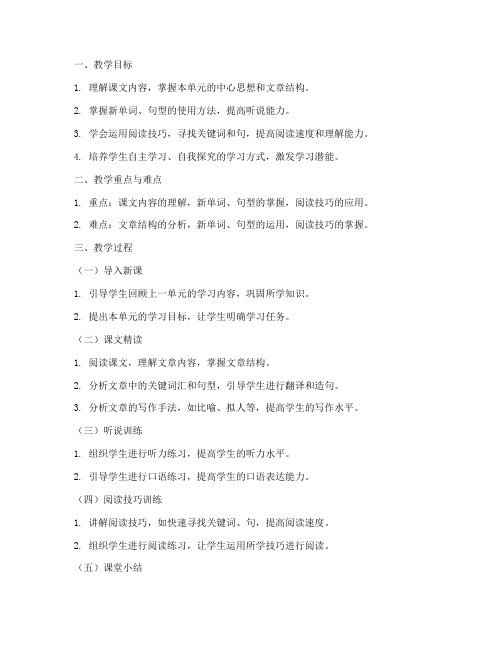
一、教学目标1. 理解课文内容,掌握本单元的中心思想和文章结构。
2. 掌握新单词、句型的使用方法,提高听说能力。
3. 学会运用阅读技巧,寻找关键词和句,提高阅读速度和理解能力。
4. 培养学生自主学习、自我探究的学习方式,激发学习潜能。
二、教学重点与难点1. 重点:课文内容的理解,新单词、句型的掌握,阅读技巧的应用。
2. 难点:文章结构的分析,新单词、句型的运用,阅读技巧的掌握。
三、教学过程(一)导入新课1. 引导学生回顾上一单元的学习内容,巩固所学知识。
2. 提出本单元的学习目标,让学生明确学习任务。
(二)课文精读1. 阅读课文,理解文章内容,掌握文章结构。
2. 分析文章中的关键词汇和句型,引导学生进行翻译和造句。
3. 分析文章的写作手法,如比喻、拟人等,提高学生的写作水平。
(三)听说训练1. 组织学生进行听力练习,提高学生的听力水平。
2. 引导学生进行口语练习,提高学生的口语表达能力。
(四)阅读技巧训练1. 讲解阅读技巧,如快速寻找关键词、句,提高阅读速度。
2. 组织学生进行阅读练习,让学生运用所学技巧进行阅读。
(五)课堂小结1. 回顾本节课所学内容,巩固所学知识。
2. 布置课后作业,让学生巩固所学知识。
四、教学建议1. 教师在讲解课文时,应注重启发学生思考,引导学生自主学习。
2. 在进行听说训练时,教师要鼓励学生积极参与,提高学生的口语表达能力。
3. 在进行阅读技巧训练时,教师要注重培养学生的阅读兴趣,提高学生的阅读能力。
4. 教师要关注学生的个体差异,因材施教,使每个学生都能得到充分的发展。
五、课后作业1. 翻译课文中的生词和句型。
2. 用所学的阅读技巧阅读一篇英文文章,并总结文章的主要内容。
3. 准备下一节课的口语练习内容。
六、教学反思1. 教师要及时总结教学过程中的优点和不足,不断改进教学方法。
2. 关注学生的学习效果,及时调整教学进度和内容。
3. 注重培养学生的自主学习能力,激发学生的学习潜能。
大学英语精读四电子教案

课程名称:大学英语精读四授课对象:大学本科英语专业学生授课时间:2课时教学目标:1. 理解课文主题,提高学生的阅读理解能力。
2. 学习并掌握课文中的重点词汇和语法结构。
3. 培养学生的批判性思维和表达能力。
教学内容:1. 课文:《Spring Sowing》2. 重点词汇:spring, sowing, reap, barren, fertile3. 语法结构:现在分词作状语,过去分词作定语教学过程:第一课时1. 导入新课(10分钟)- 提问:What do you know about the author, Liam O'Flaherty? - 简要介绍作者背景,激发学生对课文的好奇心。
2. 课文精读(30分钟)- 阅读课文,要求学生注意理解文章的主旨和段落大意。
- 分析课文中的重点词汇和语法结构,引导学生进行翻译和造句。
- 讨论课文中的难点,如现在分词作状语,过去分词作定语等。
3. 课堂练习(20分钟)- 划分小组,进行词汇和语法练习。
- 针对课文内容,进行问答和讨论。
第二课时1. 复习上节课内容(10分钟)- 复习重点词汇和语法结构,巩固学习成果。
2. 课文拓展(30分钟)- 引导学生思考课文主题,探讨与课文相关的话题。
- 例如:如何克服困难,实现自己的目标?- 鼓励学生发表自己的观点,培养学生的批判性思维。
3. 课堂讨论(20分钟)- 针对课文内容,进行小组讨论,分享学习心得。
- 鼓励学生运用所学知识,进行口头表达。
4. 总结与作业布置(10分钟)- 总结本节课的学习内容,强调重点。
- 布置课后作业,如:- 复习课文,翻译并背诵重点段落。
- 撰写一篇关于课文主题的短文。
教学方法:1. 讲授法:讲解重点词汇和语法结构。
2. 讨论法:引导学生进行课堂讨论,培养学生的批判性思维。
3. 练习法:通过课堂练习,巩固学习成果。
教学评价:1. 课堂参与度:观察学生在课堂上的发言情况,评价其学习积极性。
大学英语精读第一册教案

课时:2课时教学目标:1. 理解课文内容,掌握工业管理工程师Sam Adams的故事和经历。
2. 扩大词汇量,学会使用与工业管理相关的专业词汇。
3. 提高阅读理解能力,培养学生的批判性思维。
4. 培养学生的口语表达能力,通过小组讨论和角色扮演等活动进行实践。
教学重点:1. 课文内容理解2. 专业词汇学习3. 阅读理解技巧教学难点:1. 专业词汇的理解和应用2. 课文中的逻辑关系和批判性思维教学准备:1. 课文原文2. 课文翻译3. 词汇卡片4. 小组讨论材料5. 角色扮演道具教学过程:第一课时一、导入1. 教师简要介绍Sam Adams的背景和工业管理工程师的职业特点。
2. 学生自由发言,分享自己对工业管理工程师的理解。
二、课文精读1. 学生朗读课文,注意语音、语调。
2. 教师带领学生分析课文结构,讲解课文中的关键信息。
3. 学生分组讨论课文中的重点内容,如Sam Adams的职业生涯、遇到的挑战等。
三、词汇学习1. 教师展示词汇卡片,讲解课文中的专业词汇。
2. 学生跟读、拼写、造句,加深对词汇的记忆。
四、课堂小结1. 教师总结本节课的主要内容,强调重点和难点。
2. 学生复述课文中的关键信息,巩固所学知识。
第二课时一、复习1. 学生朗读课文,复习课文内容。
2. 教师提问,检查学生对课文的理解。
二、小组讨论1. 学生分组讨论课文中的问题,如Sam Adams如何提高衬衫厂的效率?2. 小组代表分享讨论结果,其他学生补充。
三、角色扮演1. 学生根据课文内容,选择角色进行角色扮演。
2. 角色扮演过程中,学生运用所学词汇和语法知识。
四、课堂小结1. 教师总结本节课的主要内容,强调重点和难点。
2. 学生复述课文中的关键信息,巩固所学知识。
五、作业布置1. 学生完成课后练习题,巩固所学知识。
2. 预习下一课内容,为下节课做好准备。
教学反思:本节课通过精读课文、词汇学习、小组讨论和角色扮演等活动,使学生掌握了课文内容,提高了阅读理解能力和口语表达能力。
大学精读4教案

教学对象:大学英语专业学生教学目标:1. 理解并掌握课文内容,提高学生的阅读理解能力。
2. 培养学生的词汇运用能力,扩大词汇量。
3. 培养学生的写作能力,提高写作水平。
4. 培养学生的口语表达能力,提高口语水平。
教学内容:1. 课文内容:《现代大学英语精读4》课文。
2. 相关背景知识:作者介绍、文化背景等。
教学过程:一、导入(5分钟)1. 向学生介绍课文作者及背景知识。
2. 提问:学生是否了解作者及背景知识,简要分享。
二、课文精读(25分钟)1. 学生自读课文,勾画生词和不懂的句子。
2. 教师带领学生逐句翻译,解释生词和难句。
3. 学生朗读课文,教师纠正发音和语调。
三、课堂讨论(15分钟)1. 教师提出问题,引导学生思考课文内容。
2. 学生分组讨论,分享观点和见解。
3. 各组代表发言,教师点评。
四、写作训练(10分钟)1. 教师给出写作题目,要求学生在规定时间内完成。
2. 学生写作,教师巡视指导。
五、口语表达(5分钟)1. 教师提出口语话题,要求学生用英语进行表达。
2. 学生分组练习,教师点评。
六、总结(5分钟)1. 教师总结本节课的学习内容,强调重点和难点。
2. 学生提问,教师解答。
教学评价:1. 课后作业:要求学生完成课文后的练习题,巩固所学知识。
2. 课堂表现:观察学生在课堂上的发言、讨论、写作等表现。
3. 课后反思:学生撰写课后反思,总结学习心得。
教学资源:1. 《现代大学英语精读4》教材。
2. 教学课件。
3. 网络资源:相关背景知识、练习题等。
教学反思:1. 课后反思,总结教学过程中的优点和不足。
2. 不断调整教学方法和策略,提高教学质量。
大学英语精读(修订版)教案
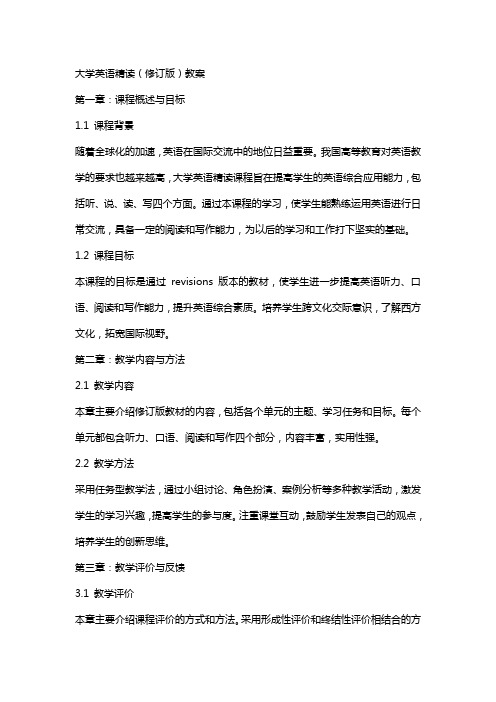
大学英语精读(修订版)教案第一章:课程概述与目标1.1 课程背景随着全球化的加速,英语在国际交流中的地位日益重要。
我国高等教育对英语教学的要求也越来越高,大学英语精读课程旨在提高学生的英语综合应用能力,包括听、说、读、写四个方面。
通过本课程的学习,使学生能熟练运用英语进行日常交流,具备一定的阅读和写作能力,为以后的学习和工作打下坚实的基础。
1.2 课程目标本课程的目标是通过revisions 版本的教材,使学生进一步提高英语听力、口语、阅读和写作能力,提升英语综合素质。
培养学生跨文化交际意识,了解西方文化,拓宽国际视野。
第二章:教学内容与方法2.1 教学内容本章主要介绍修订版教材的内容,包括各个单元的主题、学习任务和目标。
每个单元都包含听力、口语、阅读和写作四个部分,内容丰富,实用性强。
2.2 教学方法采用任务型教学法,通过小组讨论、角色扮演、案例分析等多种教学活动,激发学生的学习兴趣,提高学生的参与度。
注重课堂互动,鼓励学生发表自己的观点,培养学生的创新思维。
第三章:教学评价与反馈3.1 教学评价本章主要介绍课程评价的方式和方法。
采用形成性评价和终结性评价相结合的方式,全面评估学生的学习成果。
形成性评价主要通过课堂表现、作业和小组活动进行,终结性评价则通过期中和期末考试来评估学生的综合能力。
3.2 教学反馈教师应及时给予学生反馈,指出其在学习过程中的优点和不足,引导学生进行自我调整。
鼓励学生相互评价,共同进步。
第四章:教学资源与辅助工具4.1 教学资源本章主要介绍教师可用的教学资源,如教材、多媒体课件、网络资源等。
教师应根据教学需要,合理运用各种资源,提高教学质量。
4.2 辅助工具介绍一些实用的教学辅助工具,如在线翻译、语音识别软件、学习APP等。
教师可引导学生利用这些工具进行自主学习,提高学习效果。
第五章:教学设计与实施5.1 教学设计本章主要介绍教学设计的基本原则和方法。
教师应根据学生的实际情况,设计适合的教学活动,确保教学目标的实现。
大学英语精读1unit10教案
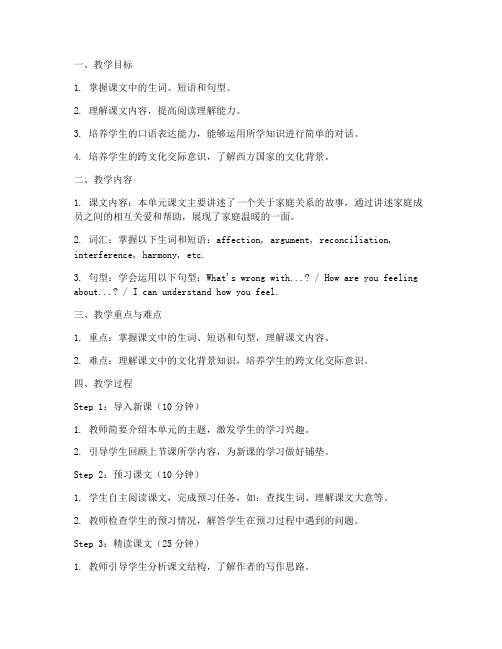
一、教学目标1. 掌握课文中的生词、短语和句型。
2. 理解课文内容,提高阅读理解能力。
3. 培养学生的口语表达能力,能够运用所学知识进行简单的对话。
4. 培养学生的跨文化交际意识,了解西方国家的文化背景。
二、教学内容1. 课文内容:本单元课文主要讲述了一个关于家庭关系的故事,通过讲述家庭成员之间的相互关爱和帮助,展现了家庭温暖的一面。
2. 词汇:掌握以下生词和短语:affection, argument, reconciliation, interference, harmony, etc.3. 句型:学会运用以下句型:What's wrong with...? / How are you feeling about...? / I can understand how you feel.三、教学重点与难点1. 重点:掌握课文中的生词、短语和句型,理解课文内容。
2. 难点:理解课文中的文化背景知识,培养学生的跨文化交际意识。
四、教学过程Step 1:导入新课(10分钟)1. 教师简要介绍本单元的主题,激发学生的学习兴趣。
2. 引导学生回顾上节课所学内容,为新课的学习做好铺垫。
Step 2:预习课文(10分钟)1. 学生自主阅读课文,完成预习任务,如:查找生词、理解课文大意等。
2. 教师检查学生的预习情况,解答学生在预习过程中遇到的问题。
Step 3:精读课文(25分钟)1. 教师引导学生分析课文结构,了解作者的写作思路。
2. 教师讲解课文中的重点词汇、短语和句型,并进行例句演示。
3. 学生跟读课文,加深对课文内容的理解。
Step 4:课堂讨论(15分钟)1. 教师提出与课文相关的问题,引导学生进行讨论。
2. 学生分组讨论,分享自己的观点和感受。
Step 5:巩固练习(10分钟)1. 教师布置课后练习题,巩固学生对课文知识的掌握。
2. 学生独立完成练习,教师巡视指导。
Step 6:总结与作业布置(5分钟)1. 教师对本节课所学内容进行总结,强调重点和难点。
- 1、下载文档前请自行甄别文档内容的完整性,平台不提供额外的编辑、内容补充、找答案等附加服务。
- 2、"仅部分预览"的文档,不可在线预览部分如存在完整性等问题,可反馈申请退款(可完整预览的文档不适用该条件!)。
- 3、如文档侵犯您的权益,请联系客服反馈,我们会尽快为您处理(人工客服工作时间:9:00-18:30)。
大学英语精读一课文加翻译(转自baidu知道)Some Strategies for Learning EnglishLearning English is by no means easy. It takes great diligence and prolonged effort.学习英语绝非易事.它需要刻苦和长期努力.Nevertheless, while you cannot export to gain a good command of English without sustained hard work, there are various helpful learning strategies you employ to make the task easier. Here are some of them.虽然不经过持续的刻苦努力便不能期望精通英语,然而还是有各种有用的学习策略可以用来使这一任务变得容易一些.一下便是其中的几种.1. Do not treat all new words in exactly the same way. Have you ever complained about your memory because you find it simply impossible to memorize all the new words you are learning? But, in fact, it is not your memory that is at fault. If you cram your head with too many new words at a time, some of them are bound to be crowded out. What you need to do is to deal with new words in different ways according it how frequently they occur in everyday use. While active words demand constant practice and useful words must be committed to memory, words that do not often occur in everyday situations require just a nodding acquaintance. You will find concentrating on active and useful words the most effective route to enlarging your vocabulary. 不要以完全相同的方式对待所有的生词.你可曾因为简直无法记住所学的所有生词而抱怨自己的记忆力太差?其实,责任并不在你的记忆力.如果你一下子把太多的生词塞进头脑,必定有一些生词会被挤出来.你需要做的是根据生词日常使用的频率以不同的方式对待它们.积极词汇需要经常练习,有用的词汇必须牢记,而在日常情况下不常出现的次只需要见到时认识即可.你会发现把注意力集中于积极有用的词上是扩大词汇量最有效的途径.2. Watch out for idiomatic ways of saying things. Have you ever wondered why we say, “I am interested in English”, but “I am good at French”? And have you ever asked yourself why native English speakers say, “learn the news or secret”, but “learn of someone’s success or arrival”? These are all examples of idiomatic usage. In learning English, you must pay attention not only to the meaning of a word, but also to the way native speakers use it in their daily lives.密切注意地道的表达方式.你可曾纳闷过,为什么我们说“我对英语感兴趣”是“I’m interested in English”, 而说“我精于法语”则是“I’m good at French”? 你可曾问过自己,为什么以英语为母语的人说“获悉消息或秘密”是“learn the news or secret”, 而“获悉某人的成功或到来”是“learn of someone’s successor arrival”?这些都是惯用法的例子.再学习英语时,你不仅必须注意词义,还必须注意以英语为母语的人在日常生活中如何使用它.3. Listen to English every day. Listening to English on a regular basis will not only improve your ear, but will also help you build your speaking skills. In addition to language tapes especially prepared for your course, you can also listen to English radio broadcasts, watch English TV, and see English movies. The first time you listen to a taped conversation or passage in English, you may not be able to catch a great deal. Try to get its general meaning first and listen to it over and over again. You will find that with each repetition you will get something more.每天听英语.经常听英语不仅不提高你的听力,而且有助你培养说的技能.除了专为课程准备的语言磁带外,你还可以听英语广播,看英语电视和英语电影.第一次听录好音的英语对话或语段,你也许不能听懂很多.先试着听懂大意,然后再反复地听.你会发现每次重复都会听懂很多更多的东西.4. Seize opportunities to speak. It is true that there are few situations at school where you have to communicate in English, but you can seek out opportunities to practice speaking the language. Talking with your classmates, for example, can be an easy and enjoyable way to get some practice. Also try to find native speaker on your campus and feel free to talk with them. Perhaps the easiest way to practice speaking is to rehearse aloud, since this can be done at any time, in any place, and without a partner. For instance, you can look at pictures or objects around you and try to describe them in detail. You can also rehearse everyday situations. After you have made a purchase in a shop or finished a meal in a restaurant and paid the check, pretend that all this happened in an English-speaking country and try to act it out in English.抓住机会说.的确,在学校里必须用英语交流的场合并不多,但你还是可以找到练习的英语的机会.例如,跟你的同班同学进行交谈可能就是得到一些练习的一种轻松愉快的方式.还可以找校园里以英语为母语的人跟他们随意交谈.或许练习讲英语最容易的方式是高声朗读,因为这在任何时间,任何地方,不需要搭档就可以做到.例如,你可以看着图片或身边的物件,试着对它们详加描述.你还可以复述日常情景.在商店里购物或在餐馆里吃完饭付过账后,假装这一切都发生在一个讲英语的国家,试着用英语把它表演出来.5. Read widely. It is important to read widely because is our learning environment; reading is the main and most reliable source of language input. When you choose reading materials, look for things that you find interesting, that you can understand without relying too much on a dictionary. A page a day is a good way to start. As you go on, you will find that you can do more pages a day and handle materials at a higher lever of difficulty.广泛阅读.广泛阅读很重要,因为在我们的学习环境中,阅读是最重要,最可靠的语言输入来源.在选择阅读材料时,要找你认为有趣的,不需要过多依赖词典就能看懂的东西.开始时每天读一页是个好办法.接下去,你就会发现你每天可以读更多页,而且能对付难度更高的材料.6. Write regularly. Writing is a good way to practice what you already know. Apart from compositions assigned by your teacher, you may find your own reasons for writing. A pen pal provides good motivation; you will learn a lot by trying to communicate with someone who shares your interests, but comes from a different culture. Other ways to write regularly include keeping a diary, writing a short story and summarizing the daily news.经常写,写作是练习你已经学会的东西的好方法.除了老师布置的作文,你还可以找到自己要写的理由.有个笔友可以提供很好的动力;与某个跟你趣味相投但来自不同文化的人进行交流,你会学到很多东西.经常写作的其他方式还有记日记,写小故事或概述每天的新闻.Language learning is a process of accumulation. It pays to absorb as much as you can from reading and listening and then try to put what you have learned into practice through speaking and writing.语言学习是一个积累的过程.从读和听中吸收尽量多的东西,然后再试着把学到的东西通过说和写 .。
